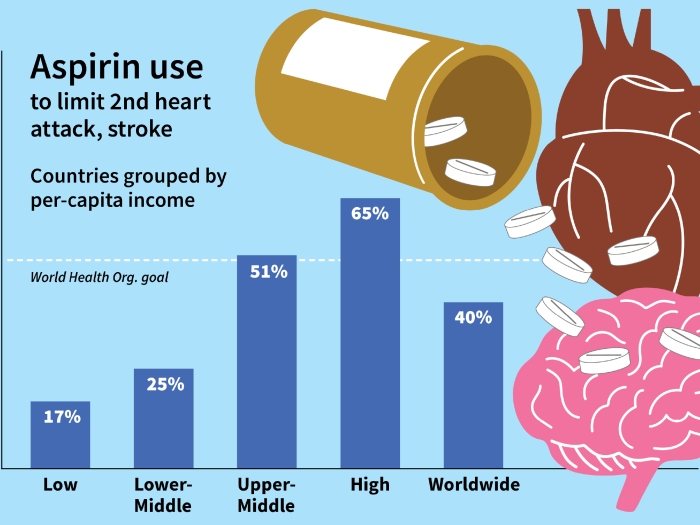A new study finds patients were taking too many antithrombotics for no reason, leading to a significant increase in bleeding events.
4:52 PM
Author |

A daily aspirin is a commonly used, generally safe therapy for people who need help preventing heart attacks or stroke.
But new Michigan Medicine research finds more reason to reconsider aspirin use when a patient is also taking an anticoagulant.
The study, just published in JAMA Internal Medicine, reveals a significant increase in adverse outcomes for people taking both aspirin and warfarin, a long-popular anticoagulant often prescribed for stroke prevention in patients with atrial fibrillation and venous thromboembolic disease. Both groups of people need to avoid developing blood clots that could lead to stroke or pulmonary embolism.
"Nearly 2,500 patients who were prescribed warfarin were taking aspirin without any clear reason, over a seven-year period," says senior author Geoffrey Barnes, M.D., M.Sc., a vascular cardiologist at the University of Michigan Frankel Cardiovascular Center and an assistant professor of internal medicine at the U-M Medical School. "No doctors really own the prescribing of aspirin, so it's possible it got overlooked."
Some patients could have been taking aspirin already when they began anticoagulation with warfarin for a new issue like Afib or VTE, and they didn't stop the aspirin. Others may have started aspirin for other reasons while already taking warfarin, which is easy to do because it's sold over the counter, researchers say.
LISTEN UP: Add the new Michigan Medicine News Break to your Alexa-enabled device, or subscribe to our daily audio updates on iTunes, Google Play and Stitcher.
More bleeding without more benefit
In this study, 5.7 percent of those using combination therapy experienced major bleeding events after one year, compared to 3.3 percent of those on warfarin only. The combination group that was using aspirin without a clear indication also visited the emergency department and/or were hospitalized for bleeding significantly more often.
No doctors really own the prescribing of aspirin, so it's possible it got overlooked.Geoffrey Barnes, M.D., M.Sc.
Yet, there wasn't a difference in stroke or heart attack outcomes that are typical uses for aspirin, Barnes says. The mortality rates at one year were similar between both groups, and 2.3 percent of those on both medications had a thrombotic event at one year compared to 2.7 percent of those on warfarin alone. The study cohort included 6,539 patients who were enrolled at six anticoagulation clinics in Michigan between 2010 and 2017.
"Clinicians should ask their patients who are anticoagulated with warfarin if they're taking aspirin as well," says first author Jordan Schaefer, M.D., a hematologist at Michigan Medicine and assistant professor of internal medicine. "For the patients who are on both therapies, clinicians should review their medical history to determine if it's really necessary to be on both drugs."
Although 37.5 percent of the patients in this study were receiving combination warfarin and aspirin therapy without a clear indication, the combination does make sense for a small number of people. Barnes says patients who may need to be on both medications include those who have had a recent heart attack, recent coronary stent placement or bypass surgery, prior mechanical valve surgery or known peripheral artery disease.
MORE FROM MICHIGAN: Sign up for our weekly newsletter
Part of a larger problem
It's the latest research on the risks of improper anticoagulant use from Barnes, who recently published findings on the use of multiple blood thinners and risk of gastrointestinal bleeding. That Vascular Medicine study, with U-M gastroenterologist Jacob Kurlander, M.D., M.Sc., found more than one-third of patients in a large study could benefit from either stopping one of their multiple blood thinners, or adding another medication (a proton pump inhibitor like Prilosec) to suppress acid production in the stomach and reduce the risk of dangerous GI bleeding.
Based on these findings, researchers are leading the charge for change in Michigan. They're working with anticoagulation clinics to help identify people who are using multiple blood thinners, and then determine if both are truly necessary, or if aspirin should be stopped.
"There's been some hint of this being an issue for a long time," Schaefer says. "Now based on these new findings, we're working to reduce the number of warfarin treated patients who are also taking aspirin, when there is not a clear reason for adding aspirin."
"We think this is an important area to address, and we're trying to make a change at the system level," says Barnes, a member of U-M's Institute for Healthcare Policy & Innovation.
Disclosure: Barnes has received grant support from Pfizer/Bristol-Myers Squibb, NHLBI, and Blue Cross Blue Shield of Michigan. He also has received consulting fees from Pfizer/Bristol-Myers Squibb, Janssen, and Portola.

Explore a variety of healthcare news & stories by visiting the Health Lab home page for more articles.

Department of Communication at Michigan Medicine
Want top health & research news weekly? Sign up for Health Lab’s newsletters today!





